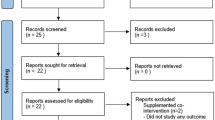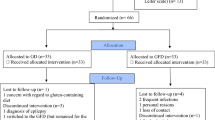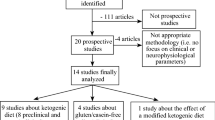Abstract
Purpose
Effective treatments for core symptoms of autism spectrum disorders (ASD) are lacking. We systematically updated evidence on the effectiveness of a gluten-free and casein-free (GFCF) diet as a treatment for ASD in children.
Methods
The Cochrane Library, MEDLINE, and EMBASE databases were searched up until August 2016, for randomized controlled trials (RCTs); additional references were obtained from reviewed articles.
Results
Six RCTs (214 participants) were included. With few exceptions, there were no statistically significant differences in autism spectrum disorder core symptoms between groups, as measured by standardized scales. One trial found that compared with the control group, in the GFCF diet group there were significant improvements in the scores for the ‘communication’ subdomain of the Autism Diagnostic Observation Schedule and for the ‘social interaction’ subdomain of the Gilliam Autism Rating Scale. Another trial found significant differences between groups in the post-intervention scores for the ‘autistic traits’, ‘communication’, and ‘social contact’ subdomains of a standardized Danish scheme. The remaining differences, if present, referred to parent-based assessment tools or other developmental/ASD-related features. No adverse events associated with a GFCF diet were reported.
Conclusions
Overall, there is little evidence that a GFCF diet is beneficial for the symptoms of ASD in children.

Similar content being viewed by others
References
American Psychiatric Association (2013) Autism spectrum disorder. In: Diagnostic and Statistical Manual of Mental Disorders, 5th edn. American Psychiatric Association, Arlington, p 50
World Health Organization. Autism spectrum disorders. http://www.who.int/mediacentre/factsheets/autism-spectrum-disorders/en/. Accessed 31 Aug 2016
Rybakowski F, Chojnicka I, Dziechciarz P et al (2016) The role of genetic factors and pre- and perinatal influences in the etiology of autism spectrum disorders—indications for genetic referral. Psychiatr Pol 50:543–554
Salomone E, Charman T, McConachie H, Warreyn P (2015) Working group 4, COST action “Enhancing the Scientific Study of Early Autism”: prevalence and correlates of use of complementary and alternative medicine in children with autism spectrum disorder in Europe. Eur J Pediatr 174:1277–1285
Horvath A, Łukasik J, Szajewska H (2016) Omega-3 fatty acids and autism spectrum disorders in children: a systematic review and meta-analysis. J Nutr. Accepted for publication
Reichelt KL, Knivsberg A, Lind G, Nødland M (1991) Probable etiology and possible treatment of childhood autism. Brain Dysfunct 4:308–319
Whiteley P, Shattock P, Knivsberg AM et al (2013) Gluten- and casein-free dietary intervention for autism spectrum conditions. Front Hum Neurosci 6:344
Millward C, Ferriter M, Calver S, Connell-Jones G (2008) Gluten- and casein-free diets for autistic spectrum disorder. Cochrane Database Syst Rev 16:CD003498
First MB (1994) Diagnostic and statistical manual of mental disorders (DSM-IV), 4th edn. American Psychiatric Association, Washington, DC
American Psychiatric Association (2000) Diagnostic and statistical manual of mental disorders. Text Revision (DSM-IV-TR), 4th edn. American Psychiatric Association, Washington, DC
World Health Organization (2016) Manual of the International Statistical Classification of the Diseases and Related Health Problems. 10th edn. http://www.who.int/classifications/icd/en/. Accessed 3 Sept 2016
Schünemann H, Brozek J, Guyatt G, Oxman A (2016) GRADE handbook for grading quality of evidence and strength of recommendations. http://www.guidelinedevelopment.org/handbook. Accessed 3 Sept 2016
Elder JH, Shankar M, Shuster J, Theriaque D, Burns S, Sherrill L (2006) The gluten-free, casein-free diet in autism: results of a preliminary double blind clinical trial. J Autism Dev Disord 36:413–420
Knivsberg AM, Reichelt KL, Høien T, Nødland M (2002) A randomised, controlled study of dietary intervention in autistic syndromes. Nutr Neurosci 5:251–261
Johnson CR, Handen BL, Zimmer M, Sacco K, Turner K (2011) Effects of gluten free/casein free diet in young children with autism: a pilot study. J Dev Phys Disabil 23:213–225
Navarro F, Pearson DA, Fatheree N, Mansour R, Hashmi SS, Rhoads JM (2015) Are ‘leaky gut’ and behavior associated with gluten and dairy containing diet in children with autism spectrum disorders? Nutr Neurosci 18:177–185
Pusponegoro HD, Ismael S, Firmansyah A, Sastroasmoro S, Vandenplas Y (2015) Gluten and casein supplementation does not increase symptoms in children with autism spectrum disorder. Acta Paediatr 104:e500–e505
Whiteley P, Haracopos D, Knivsberg AM et al (2010) The ScanBrit randomised, controlled, single-blind study of a gluten- and casein-free dietary intervention for children with autism spectrum disorders. Nutr Neurosci 13:87–100
Rutter M, Le Couteur A, Lord C (2003) Autism diagnostic interview-revised manual. Western Psychological Services, Los Angeles
Lord C, Rutter M, Di Lavore P, Risi S (1999) Autism diagnostic observation schedule: manual. Western Psychological Services, Los Angeles
Charman T, Taylor E, Drew A, Cockerill H, Brown JA, Baird G (2005) Outcome at 7 years of children diagnosed with autism at age 2: predictive validity of assessments conducted at 2 and 3 years of age and pattern of symptom change over time. J Child Psychol Psychiatry 46:500–513
Murray JA (2006) Gluten-free diet: the medical and nutrition management of celiac disease. Nutr Clin Pract 21:1–15
Greenlee JL, Mosley AS, Shui AM, Veenstra-VanderWeele J, Gotham KO (2016) Medical and behavioral correlates of depression history in children and adolescents with autism spectrum disorder. Pediatrics 137:S105–S114
Knivsberg AM, Reichelt KL, Nødland M, Høien T (1995) Autistic syndromes and diet: a follow-up study. Scan J Educ Res 39:223–236
Lord C, Wagner A, Rogers S et al (2005) Challenges in evaluating psychosocial interventions for autistic spectrum disorders. J Autism Dev Disord 35:695–708
Masi A, Lampit A, Glozier N, Hickie IB, Guastella AJ (2015) Predictors of placebo response in pharmacological and dietary supplement treatment trials in pediatric autism spectrum disorder: a meta-analysis. Transl Psychiatry 22(5):e640
Author information
Authors and Affiliations
Contributions
AH initially conceptualized this study. AP and JŁ were responsible for data collection. HS and AH assumed the main responsibility for the writing of this manuscript. All authors were responsible for data analysis and data interpretation. All authors contributed to (and agreed upon) the final version of this manuscript.
Corresponding author
Ethics declarations
Conflict of interests
AH and AP are the recipients of a grant from the Fundacja Nutricia (Nutricia Foundation) under Grant RG8/2013 to carry out the study on ASD and a gluten-free diet. Other authors declare no conflict of interests.
Electronic supplementary material
Below is the link to the electronic supplementary material.
Rights and permissions
About this article
Cite this article
Piwowarczyk, A., Horvath, A., Łukasik, J. et al. Gluten- and casein-free diet and autism spectrum disorders in children: a systematic review. Eur J Nutr 57, 433–440 (2018). https://doi.org/10.1007/s00394-017-1483-2
Received:
Accepted:
Published:
Issue Date:
DOI: https://doi.org/10.1007/s00394-017-1483-2




